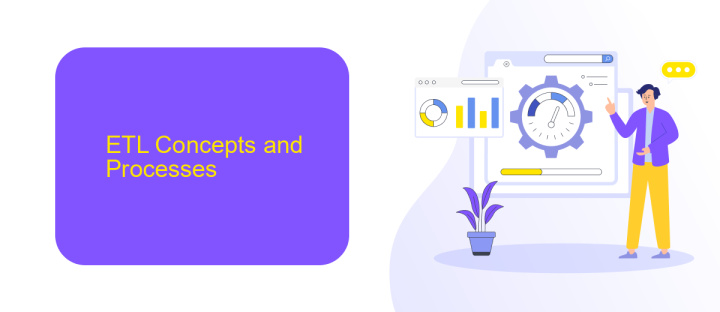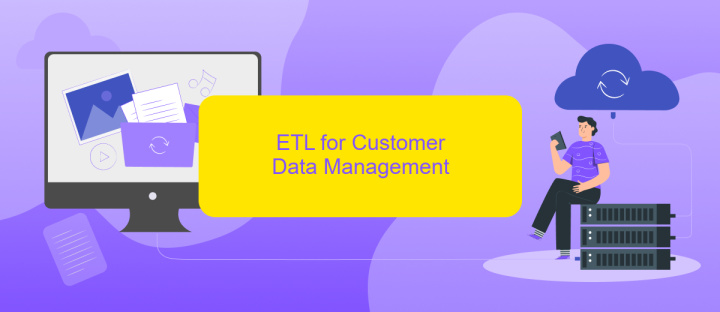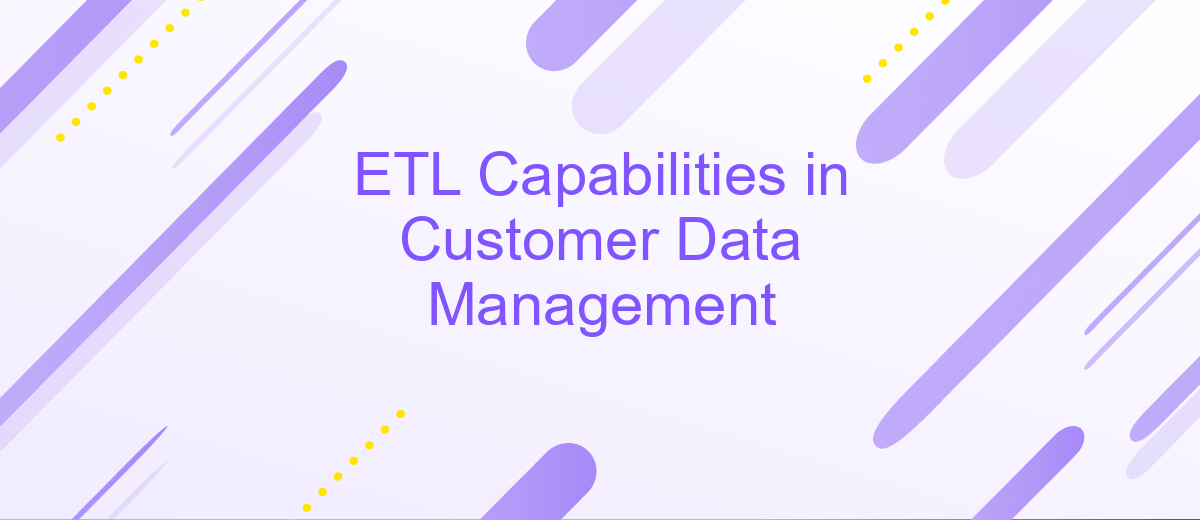ETL Capabilities in Customer Data Management
In today's data-driven world, effective customer data management is crucial for business success. ETL (Extract, Transform, Load) capabilities play a vital role in this process by ensuring data is accurately extracted from various sources, transformed into a consistent format, and loaded into a centralized database. This article explores the key ETL functionalities that enhance customer data management and drive informed decision-making.
Introduction
In today's data-driven world, managing customer data efficiently is crucial for businesses to stay competitive. One of the key processes that facilitate this is ETL (Extract, Transform, Load), which enables organizations to gather, process, and store data from various sources. ETL capabilities are essential in customer data management as they ensure data accuracy, consistency, and accessibility.
- Extract: Collecting data from diverse sources such as databases, APIs, and flat files.
- Transform: Converting data into a suitable format for analysis, including data cleaning and enrichment.
- Load: Storing the transformed data into a data warehouse or another target system for further use.
Services like ApiX-Drive simplify the integration process by providing seamless connections between different data sources and destinations. With such tools, businesses can automate data workflows, reduce manual efforts, and ensure real-time data synchronization. This enhances the overall efficiency of customer data management, enabling better decision-making and personalized customer experiences.
ETL Concepts and Processes

ETL, which stands for Extract, Transform, Load, is a fundamental process in customer data management. The process begins with extracting data from various sources, such as databases, APIs, and flat files. This data is then transformed into a suitable format, which includes cleaning, aggregating, and enriching the data to ensure it meets the required standards. Finally, the transformed data is loaded into a target system, such as a data warehouse or a customer relationship management (CRM) system, where it can be analyzed and utilized for decision-making.
Effective ETL processes are crucial for maintaining data quality and consistency. Tools like ApiX-Drive streamline this process by providing seamless integration capabilities. ApiX-Drive allows businesses to automate the extraction and loading of data from multiple sources, reducing manual efforts and minimizing errors. Additionally, it supports a wide range of data transformations, ensuring that the data is accurate and ready for analysis. By leveraging such tools, organizations can enhance their customer data management strategies, leading to better insights and improved customer experiences.
ETL for Customer Data Management

Effective ETL (Extract, Transform, Load) processes are crucial for managing customer data efficiently. These processes help in collecting data from various sources, transforming it into a suitable format, and loading it into a centralized database. This ensures that businesses have accurate, up-to-date information to make informed decisions.
- Extraction: Gather data from multiple sources such as CRM systems, social media, and transaction records.
- Transformation: Cleanse and standardize the data to ensure consistency and accuracy.
- Loading: Import the transformed data into a data warehouse or other storage solutions for easy access and analysis.
Services like ApiX-Drive simplify the integration process by offering automated workflows that connect various data sources seamlessly. This reduces the manual effort involved in setting up and maintaining integrations, allowing businesses to focus more on data analysis and strategy. Utilizing such tools ensures that the ETL process is efficient, reliable, and scalable, ultimately improving customer data management.
Benefits and Considerations

Implementing ETL (Extract, Transform, Load) processes in customer data management offers numerous benefits. These processes enable organizations to consolidate data from various sources, ensuring a unified and accurate customer view. This holistic approach enhances decision-making, improves customer experiences, and drives business growth.
However, there are several considerations to keep in mind when implementing ETL capabilities. The complexity of data integration, data quality issues, and the need for real-time processing can pose challenges. Selecting the right tools and services is crucial for overcoming these obstacles.
- Improved data accuracy and consistency
- Enhanced customer insights and personalization
- Streamlined data integration and management
- Scalability to handle growing data volumes
Services like ApiX-Drive can simplify the integration process by automating data transfers between various platforms. This not only saves time but also reduces the risk of errors, ensuring that your ETL processes are efficient and reliable. By leveraging such tools, businesses can focus on extracting valuable insights from their customer data.


Conclusion
The capabilities of ETL (Extract, Transform, Load) in customer data management are pivotal for businesses aiming to harness the full potential of their data. By efficiently extracting data from various sources, transforming it into meaningful insights, and loading it into a centralized repository, companies can make informed decisions that drive growth and improve customer satisfaction. The seamless integration of ETL processes ensures data accuracy, consistency, and accessibility, which are crucial for maintaining a competitive edge in today's data-driven world.
Moreover, leveraging advanced integration services such as ApiX-Drive can further enhance the efficiency of ETL processes. ApiX-Drive simplifies the integration of disparate data sources, automating workflows and reducing the need for manual intervention. This not only saves time and resources but also minimizes errors, ensuring that businesses have access to reliable and up-to-date customer data. In conclusion, the strategic implementation of ETL capabilities, supported by robust integration tools, is essential for optimizing customer data management and achieving business success.
FAQ
What is ETL in Customer Data Management?
Why is ETL important for Customer Data Management?
Can ETL processes be automated?
What challenges might one face when implementing ETL for Customer Data Management?
How often should ETL processes be run in Customer Data Management?
Time is the most valuable resource for business today. Almost half of it is wasted on routine tasks. Your employees are constantly forced to perform monotonous tasks that are difficult to classify as important and specialized. You can leave everything as it is by hiring additional employees, or you can automate most of the business processes using the ApiX-Drive online connector to get rid of unnecessary time and money expenses once and for all. The choice is yours!

